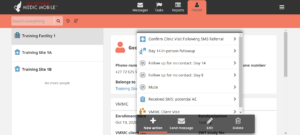The Integrated Next-generation Surveillance in Global Health: Translation to Action (INSIGHT to Action) project is a five-year cooperative agreement with the US Centers for Disease Control and Prevention to assess and strengthen global public health surveillance systems using a One Health approach. The INSIGHT project leverages the capacity building strengths of I-TECH and the One Health disease surveillance expertise of the Center for One Health Research, with a model of engaging local institutions and experts in countries where it will be working in a shared partnership model.
In its first year, the INSIGHT project focused on an in depth assessment of the public health surveillance systems in Peru, in partnership with experts from University of Peru Cayetano Heredia. The completed assessment has now catalyzed the formation of a technical working group with representation across multiple government agencies that will work with other stakeholders including the World Bank at implementing measures to strengthen regional and country capacity to detect, respond to, control, and prevent emerging disease threats to health security.
The INSIGHT surveillance work in Latin America is also now expanding to involve Paraguay, Brazil, Argentina, and Colombia.
IDASH TRAINING PROGRAM
In 2023, the INSIGHT program launched the Informatics and Data Science for Health (IDASH) training program in Eastern Europe and Central Asia. The goals of IDASH are to enhance capacity to create and use public health information systems that enable the capture, management, analysis, dissemination, and use of reliable, timely information to improve population-level health outcomes, as well as strengthen regional capacity to effectively respond to future global health challenges.
UKRAINE RECOVERY
Building on lessons learned from the Peru assessment work, the INSIGHT team is now working with the Ukraine Public Health Center on expanding sentinel and event based surveillance systems in Ukraine and strengthening the capacity of the public health system for emergency management of chemical biological, radiological, and nuclear threats. The INSIGHT team has organized a workshop in Poland bringing together key principals from the Ukraine ministry of health and local health departments to accelerate the pace of activities in support of public health in the country. INSIGHT is coordinating technical working groups on Early Warning and Response, Public Health Emergency Management, and Surveillance strengthening.
